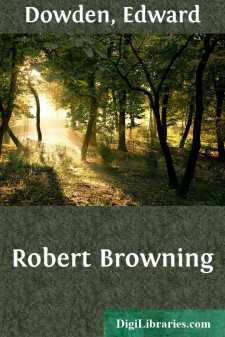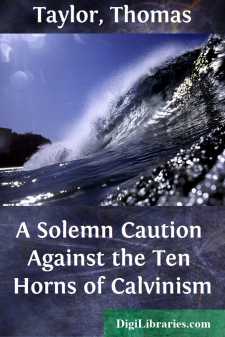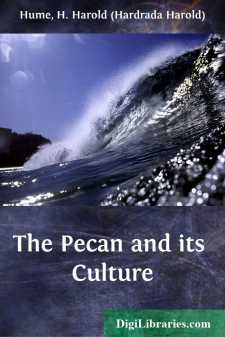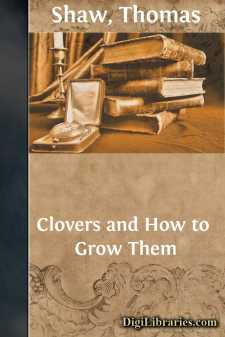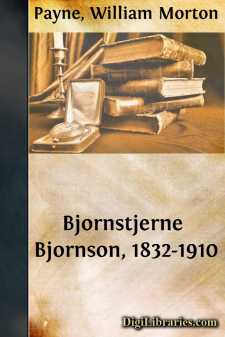Non-Classifiable
- Non-Classifiable 1768
Non-Classifiable Books
Sort by:
by:
Edward Dowden
Chapter I The ancestry of Robert Browning has been traced to an earlier Robert who lived in the service of Sir John Bankes of Corfe Castle, and died in 1746. His eldest son, Thomas, "was granted a lease for three lives of the little inn, in the little hamlet of East Woodyates and parish of Pentridge, nine miles south-west of Salisbury on the road to Exeter." Robert, born in 1749, the son of...
more...
by:
Thomas Taylor
everend Sir, THE author of the following strictures hopes your candour will pardon his addressing you in this public manner. Who he is, or what he is, signifies very little; only he begs leave to intimate, that he hopes he is a follower of that Saviour who “gave himself a ransom for all.” He was convinced when young in years, in a great measure, by reading “Alleine’s Alarm;” and the...
more...
THE JUKES Education is something more than going to school for a few weeks each year, is more than knowing how to read and write. It has to do with character, with industry, and with patriotism. Education tends to do away with vulgarity, pauperism, and crime, tends to prevent disease and disgrace, and helps to manliness, success and loyalty. Ignorance leads to all those things that education tries to...
more...
by:
Andre Dacier
INTRODUCTION André Dacier's Poëtique d'Aristote Traduite en François avec des Remarques was published in Paris in 1692. His translation of Horace with critical remarks (1681-1689) had helped to establish his reputation in both France and England. Dryden, for example, borrowed from it extensively in his Discourse Concerning the Original and Progress of Satire (1693). No doubt this earlier...
more...
by:
Owen Wister
Chapter I: Concerning One's Letter Box Publish any sort of conviction related to these morose days through which we are living and letters will shower upon you like leaves in October. No matter what your conviction be, it will shake both yeas and nays loose from various minds where they were hanging ready to fall. Never was a time when so many brains rustled with hates and panaceas that would sail...
more...
CHAPTER I. COMMERCIAL AND ORNAMENTAL IMPORTANCE OF THE PECAN. In all-around excellence, the pecan is equalled by none of the native American nut-bearing trees and certainly it is surpassed by no exotic species. It stands in the list of nut trees with but few equals and no superiors. With this fact known and admitted by all, it seems reasonable to suppose that the pecan will be grown and cultivated much...
more...
by:
Thomas Shaw
CHAPTER I INTRODUCTORY In this book all the varieties of clover will be discussed that have hitherto been found of any considerable value to the agriculture of America. Varieties that are of but little value to the farmer will be discussed briefly, if discussed at all. The discussions will be conducted from the standpoint of the practical agriculturist rather than from that of the botanist. It is...
more...
by:
Eliza Leslie
PART THE FIRST. PASTRY The eggs should not be beaten till after all the other ingredients are ready, as they will fail very soon. If the whites and yolks are to be beaten separately, do the whites first, as they will stand longer. Eggs should be beaten in a broad shallow pan, spreading wide at the top. Butter and sugar should be stirred in a deep pan with straight sides. Break every egg by itself, in a...
more...
by:
Francis Lynde
I. IN WHICH WE TAKE PASSAGE ON THE LIMITED It was a December morning,—the Missouri December of mild temperatures and saturated skies,—and the Chicago and Alton's fast train, dripping from the rush through the wet night, had steamed briskly to its terminal track in the Union Station at Kansas City. Two men, one smoking a short pipe and the other snapping the ash from a scented cigarette, stood...
more...
BJÖRNSTJERNE BJÖRNSON 1832-1910 Eight years ago, taking a bird's-eye view of the mountain peaks of contemporary literature, and writing with particular reference to Björnson's seventieth birthday, it seemed proper to make the following remarks about the most famous European authors then numbered among living men. If one were asked for the name of the greatest man of letters still living in...
more...


